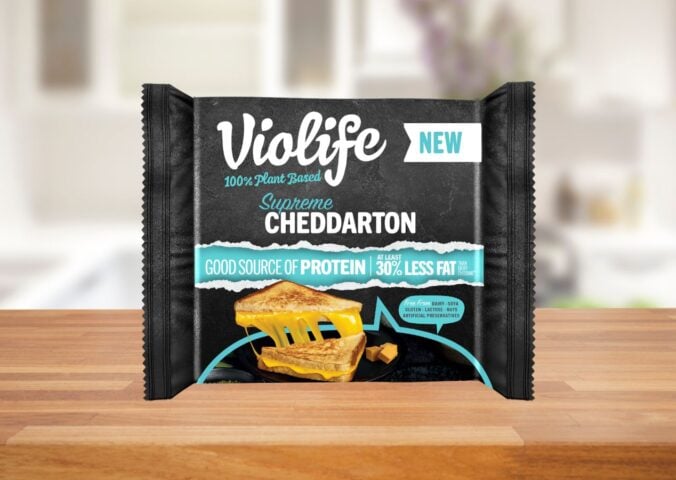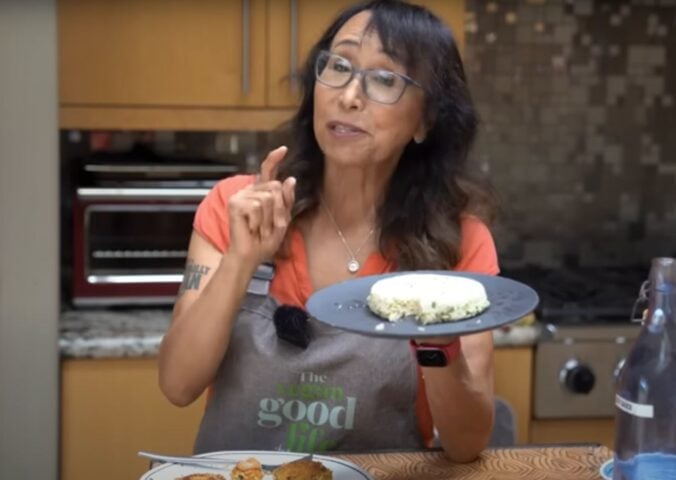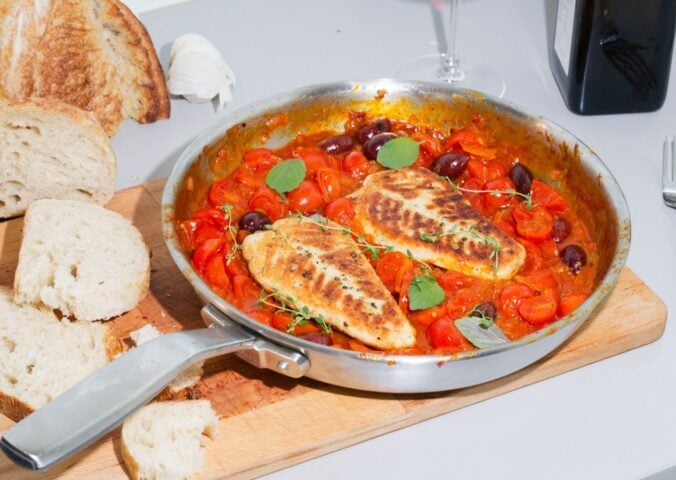* This is a sponsored post [what is this?]. We’re giving away six months of free groceries! Click here to enter the Plant-Powered Grocery Sweepstakes.
At this point, it should no longer be a shock.
And yet every time the grocery store cashier rings up the total, it’s a punch to the gut.
Groceries are far more expensive than they were just a year ago.
And that isn’t changing anytime soon.
Now before anyone jumps in with, “I told you a plant-based diet is expensive…”
Inflation has hit meat and animal products at nearly twice the rate of vegetables.
This isn’t a vegan vs. omnivore issue, it’s across the board.
For those of us that follow a plant-based diet, there’s a silver lining:
With a few changes in the way we shop, vegans are in a unique position to save drastically on our groceries.
Below you’ll find some proven techniques for cutting down your grocery budget, without cutting back on flavorful, nutritious plant-based foods.
Start with a plan (then make a list)
You’ve heard the saying, “Don’t go to the grocery store hungry.”
I’ll add to that:
Don’t go to the grocery store without a plan.
Taking a few minutes before your trip to the store to map out a meal plan for the week and compile a shopping list will save you both time and money.
It means:
- Fewer impulse purchases
- Less wasted food
- Fewer items you think you might use, but end up throwing in the trash (or cupboard)
And as a bonus, meal plans result in healthier and less random takeout.
Tip for shopping lists: Use an app that allows you to sort by store layout or section. I use “Our Groceries” which allows multiple users to update the same list — perfect for couples, roommates, or families.
Be choosy about where you shop
I dread grocery shopping as much as the next guy, so just the thought of going to multiple stores is enough to keep me from shopping altogether.
But if done right, you can take advantage of multiple stores without the hassle of multiple stops.
It starts with getting to know where to shop for what, then rotating where you go each week, stocking up on the items you need from that particular store.
Here’s my approach, but it may take some time to get to know the stores in your community:
Budget grocery store
- Dried and canned beans
- Pasta
- Grains
- Canned tomatoes or other veggies
- Plant-based milk
- Frozen veggies
- Frozen fruit
- Snacks
- Tofu
“High-end” grocery store (think Whole Foods)
- Fresh veggies
- Fresh fruit
- Natural nut butter
- Nuts and seeds
- Tempeh
- Vegan meats
- Coffee
- Specialty items
Asian or Latin grocery stores
- Fresh veggies
- Fresh fruit
- Bulk rice and grains
- Spices
- Sauces
Specialty stores (bakery, farmers’ market, natural food store)
- Fresh Vegetables
- Bread
- Bulk items
Online
- Pantry staples
- Paper goods
- Supplements
You’ll notice a lot of overlap, especially around fruits and vegetables. Depending on the season, store, and recipe, some stores may be better for specific vegetables than others.
Optimize your food choices

You’ve planned, you’ve strategized on where to shop… now you need to hit the store!
Here are seven ways to optimize your food choices for budget saving:
1) Buy foods that are in season
Shopping for seasonal produce is often recommended for freshness and the environment, but it’s also a great way to save money.
Strawberries in the summer, for example, should be much cheaper than they are in December.
And if you can shop at a local farmers’ market, you might get even better deals on produce sourced from local farms.
Tip: Ask your local farmer if they have any “seconds,” or produce that may look ugly, but is totally edible. I’ve saved hundreds on tomatoes with this approach.
2) Stay away from highly processed vegan meats
The rise of premium veggie burgers, nuggets, and vegan-meat strips have been a welcome addition to my plate. But they aren’t cheap.
Beans, lentils, tofu, meaty mushrooms, and tempeh, for example, are much cheaper.
Choosing (healthier) whole foods as your default will save you money, and potentially lead to more creativity in the kitchen!
Need recipe inspiration? Start here:
- Orange Tofu And Broccoli
- Fiery Coconut Tofu Masala Curry
- Mushroom Lentil Risotto
- Pulled Pork Style BBQ Mushroom Sandwich
- Black Bean Burgers
- White Bean Chili
- Plant-Based Scrambled Eggs
3) Buy store-brand
The stigma against store-brand products is slipping — and I’m here for it. Many store-brand products are just as good (or nearly identical) to their name-brand counterparts, for a fraction of the price.
Frozen food, canned food, pasta, and rice are all great items to choose the store-brand option.
4) Buy frozen fruits and vegetables
Buying frozen fruits, vegetables, and greens will not only provide nutritious out-of-season plant foods, but it can also save you a lot of money.
For example, right now at my local grocery store, fresh organic strawberries are $5.99 per pound, while frozen is just $3.15 per pound.
Fresh spinach is $0.50 an ounce, while frozen is $0.20 per ounce.
Of course, there are times (in a salad, for example), when frozen wouldn’t work. But when cooking, making a smoothie, or whipping up a sauce, frozen can be just as nutritious and delicious as fresh, for a fraction of the cost.
5) Buy dried legumes
Buying dried legumes — especially beans — over a canned or pre-cooked version is undoubtedly more of a hassle.
So if the option is canned beans over no beans at all, then go with canned.
But buying dried is a fantastic way to save money and gives you the option to stock up through bulk purchases.
Tip: instant pots remove a lot of that hassle.
6) Make your own
Salad dressings, pasta sauces, soups, sauces…
These are all relatively easy to make, and making your own will often produce a healthier and cheaper version.
Learning a handful of go-to recipes will cut down on time and allow for more flexibility in your cooking.
7) Reduce food waste
No matter how well you plan, sometimes your food will go bad before you can use it.
Here are a few food storage tips that will keep your produce fresher, longer:
- Fruits:
- Berries, cherries, and grapes should be refrigerated.
- Bananas should be kept away from other fruits since they release a gas that can cause other fruits to ripen too quickly.
- Greens:
- Wash and dry leafy greens, then store them in a plastic bag or sealed container in the refrigerator.
- If they’re starting to go bad, move them into the freezer to use in sauces, soups, or smoothies.
- Vegetables:
- Store root vegetables such as carrots, potatoes, and onions in a cool, dark, and dry place like a pantry or cellar.
- Tomatoes and avocados should be kept at room temperature until they are ripe, then they can be refrigerated to extend their shelf life.
- Broccoli, cauliflower, and bell peppers should be stored in a plastic bag or container in the refrigerator.
And when all else fails, freeze it!
Groceries are expensive — but as a vegan, you’re better off than you might think

Not to be a Negative Nancy, but chances are these high prices aren’t going away anytime soon.
It’s time we adjust.
With a little extra planning and care, a plant-based diet can be a great way to save money at the grocery store.
Win 6 months of free groceries
What’s better than saving money on groceries?
Getting them for free!
Plant Based News has partnered with Complement, No Meat Athlete, and High Carb Hannah to create the Plant-Powered Grocery Sweepstakes, where we’re giving away six months of fresh groceries for you and your family, plus cookbooks, meal plans, and a massive Complement nutrient bundle. It’s over $7,900 worth of prizes, and could be yours, absolutely free!
Click here to join the sweepstakes before May 24, 2023 — no purchase necessary! Please note only residents of the United States are eligible.
—
* This content is part of a branded partnership. Funds from this article help Plant Based News continue to provide millions of people around the world with free content they know and love. We only work with brands we support and use ourselves.






